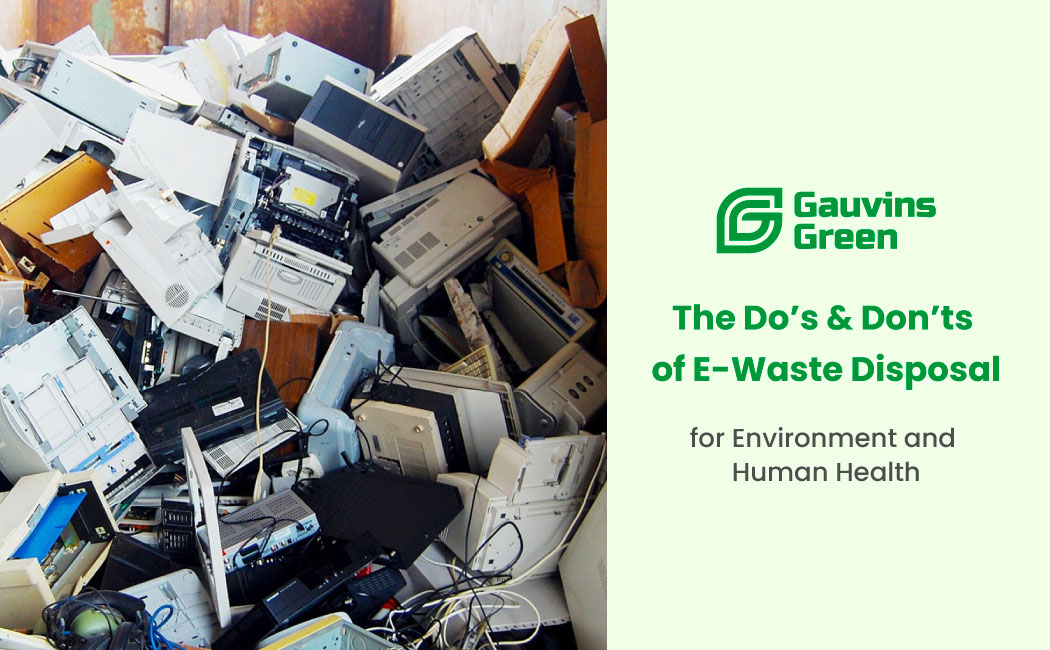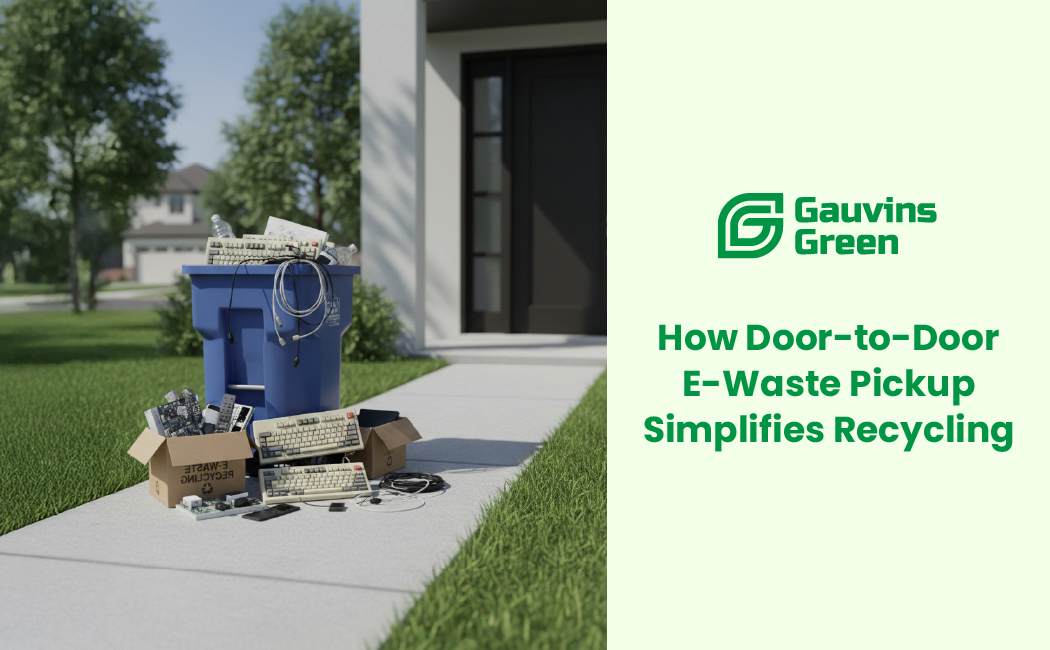|
Getting your Trinity Audio player ready...
|
In a swiftly digitizing global, the extent of digital devices discarded each 12 months has skyrocketed. From smartphones and laptops to old televisions and batteries, e-waste disposal or digital waste poses serious environmental and health risks if not managed well. Businesses, families, and governments alike are spotting the significance of adopting sustainable disposal practices to assist a Circular Economy.
This guide by Gauvins Green, a responsible leader in E-Waste Recycling and management, outlines essential Do’s and Don’ts for individuals, businesses, and institutions, aiming to protect both the planet and public health.
Table of Contents
ToggleUnderstanding E-Waste and Its Risks
E-Waste includes any discarded electrical or electronic device. Items like computers, printers, smartphones, air conditioners, and refrigerators often contain toxic substances such as lead, mercury, cadmium, and brominated flame retardants. Improper handling of these materials can lead to:
- Soil, air, and water contamination
- Respiratory and neurological disorders
- Increased greenhouse gas emissions
- Loss of valuable, reusable materials
As both individuals and organizations generate more electronic trash, embracing proper e-waste disposal management becomes crucial for environmental sustainability and human safety.
The Do’s of E-Waste Disposal
Do Collect and Segregate E-Waste Properly
Begin by setting up separate bins or collection points for e-waste at home, in offices, and in educational institutions. Segregating electronic trash from regular waste ensures that specialized recyclers can safely process these materials without contaminating other waste streams.
Pro Tip: Label bins clearly to avoid confusion and regularly educate team members or family members about which items belong there.
Do Partner with Certified E-Waste Recyclers
Working with a certified E-Waste Recycling company like Gauvins Green ensures that discarded devices are handled responsibly. Certified recyclers follow strict environmental guidelines, safely extract reusable materials, and dispose of toxic substances through approved methods.
Why It Matters: Unauthorized recyclers often use unsafe, informal techniques that pollute the environment and endanger workers.
Do Promote Reuse and Donation
Before discarding, consider donating functional electronics to NGOs, schools, or underprivileged communities. Many outdated devices may still be valuable to others, reducing unnecessary waste generation.
Circular Economy Insight: Extending the lifecycle of products supports sustainable consumption and minimizes raw material extraction.
Do Ensure Secure Data Destruction
When disposing of old computers, smartphones, or hard drives, ensure that all sensitive data is permanently wiped or destroyed. Failing to do so can result in serious privacy and security breaches.
Partner Benefit: Certified E-Waste Management companies like Gauvins Green offer secure data destruction services along with physical recycling.
Do Educate and Train Employees or Family Members
Awareness is key to effective E-Waste Management. Educate everyone around you about the dangers of electronic trash and the importance of responsible disposal. Host workshops or awareness drives in offices, schools, or communities.
Do Follow Local E-Waste Disposal Laws and Guidelines
Each region has specific laws governing E-Waste Disposal Management. Stay updated on local regulations and ensure compliance to avoid fines and contribute to sustainable waste management systems.
Fact: In India, the E-Waste Management Rules, 2022 mandate manufacturers and consumers to take responsibility for the safe disposal of E-Waste.
The Don’ts of E-Waste Disposal
Don’t Throw E-Waste in Regular Trash or Landfills
Never dispose of electronic trash with household waste. Harmful chemicals can leach into soil and groundwater, causing long-term environmental degradation and public health crises.
Don’t Attempt Informal or Unprotected Recycling
Avoid giving E-Waste to informal recyclers who lack proper equipment or training. Methods like open-air burning or acid baths to retrieve metals release toxic fumes and residues, harming both workers and the environment.
Don’t Ignore Data Security Risks
Disposing of digital devices without securely erasing data can lead to identity theft, financial fraud, or leakage of sensitive information. Always prioritize secure data destruction before recycling.
Don’t Store E-Waste Indefinitely
Stockpiling unused gadgets and broken devices clutters your space and increases future disposal risks. Regularly audit your inventory at work or home and dispose of E-Waste responsibly.
Don’t Use Unverified Disposal Services
Only engage verified, certified, and experienced E-Waste Management companies. Unregulated handlers often resort to illegal dumping or unsafe recycling, amplifying environmental damage.
Choose Wisely: Trusted names like Gauvins Green combine expertise, eco-friendly processes, and regulatory compliance.
Gauvins Green’s Best Practices for Safe E-Waste Disposal
Gauvins Green leads the charge in responsible E-Waste Recycling and management. Their solutions include:
- Certified recycling plants using advanced technology
- Secure asset management and data destruction services
- E-Waste collection drives and bulk pickup for businesses
- Community education initiatives promoting Circular Economy practices
- Environmental impact tracking and reporting for corporate partners
By collaborating with Gauvins Green, businesses and individuals can significantly reduce E-Waste and contribute to a healthier planet.
How Proper E-Waste Disposal Protects the Environment and Health
Responsible E-Waste Disposal Management offers numerous benefits:
Environmental Protection
- Prevents soil and water contamination by isolating hazardous materials
- Reduces greenhouse gas emissions through material recovery
- Supports the conservation of scarce natural resources
Health Safeguarding
- Prevents respiratory, skin, and neurological disorders linked to toxic emissions
- Eliminates informal recycling practices that exploit vulnerable workers
- Reduces public exposure to heavy metals and harmful chemicals
Economic and Social Advantages
- Creates green jobs in the recycling and sustainability sectors
- Lowers business waste management costs
- Enhances corporate social responsibility (CSR) profiles
Conclusion
In these days’ digital age, the E-Waste mission needs immediate, informed, and accountable action. Individuals and companies can actively assist in purifying, safer surroundings and healthier groups using adopting the Do’s and Don’ts of E-Waste Disposal outlined above.
As technology continues to evolve, integrating Circular Economy principles and sustainable practices is no longer optional, it’s a necessity.
Gauvins Green stands as a reliable, eco-friendly partner in this mission. Whether you need bulk corporate recycling, secure data disposal, or want to join community initiatives, they offer tailored solutions for every E-Waste challenge.




